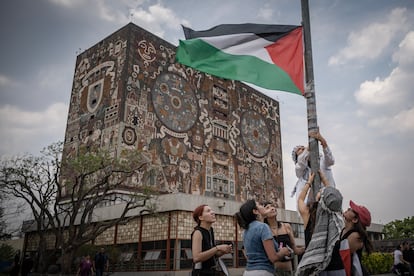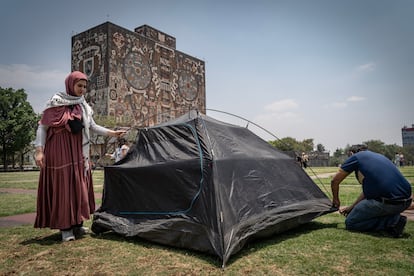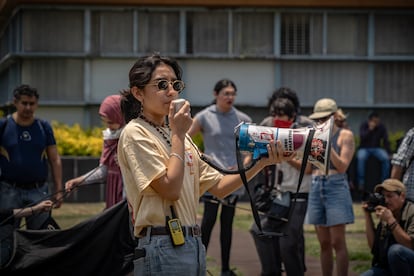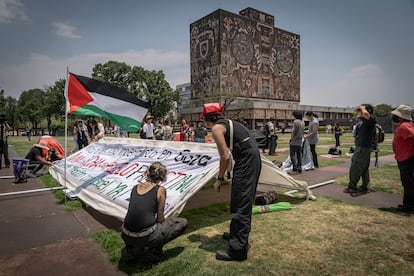University Gaza solidarity protests extend to Mexico: ‘We are urgently calling for an end to genocide’
The anti-war student movement that has occupied campuses across the United States spreads with the birth of Latin America’s first pro-Palestine camp at UNAM, the storied Mexican university


The upheaval took Nora by surprise. Many years after the Israeli occupation forced her family to leave Gaza and move to California — where she was born, grew up, studied economics, married Omar — Israel began to bomb her parents’ homeland, which she only knew from vacations, and where she hasn’t set foot for 20 of her 25 years. Many of her family members died in an offensive campaign that has cost the life of 35,000 people. The world witnessed, sadly, angrily, indifferently. In the United States, a fistful of students became fed up and occupied their universities, organized protest camps and demonstrations reminiscent of the ones that their grandparents carried out to denounce the war in Vietnam. They were repressed by the police, expelled from their universities. But the largest U.S. student uprising in years, the one that most resonates with her family’s experience as Palestinian refugees, ignited while Nora was visiting a friend in Mexico.
And then the National Autonomous University of Mexico (UNAM) heard the call. Students at the storied Latin American academic institution, a symbol of excellence in both education and political protest, held an assembly and, just like their peers north of the border, organized a protest camp that demands a “stop to imperialist genocide in Gaza” and an end to the diplomatic relationship between Mexico and Israel. The camp began on May 2, with more than 40 tents and around a hundred people, including both Arabs and Jews, situated along the esplanade between the rector’s office and the main library. Nora was one of the first to arrive.

The university protests in solidarity with Palestine have become the central focus of U.S. media outlets. From California to New York, police repression has rained down on the students, who are protesting on dozens of campuses in more than 20 states. Images of the demonstrations have been seen around the world. More than 2,000 young people have been arrested since April 18, according to a tally by the Associated Press. Reactions have been varied: Minouche Shafik, president of Columbia University, called in police intervention; the Pulitzer Prize (the most prestigious honor in the world of journalism, which is administered by Columbia), has released a statement in solidarity with “the tireless efforts of student journalists across our nation’s college campuses, who are covering protests and unrest in the face of great personal and academic risk.” And now, the protests have spread to Mexico.
On October 7, 2023, Hamas attacked Israel, killing 1,200 people. The Israeli response, driven by its far superior arsenal, has destroyed Gaza, ending the lives of 35,000 people, unleashing famine and doubling the poverty rate. Since then, says Nora, “they’ve been very frustrating months, because my family is in Gaza, they’ve been displaced so many times, we have lost many family members from the unending airstrikes and bombings. Every day we hope that the bombs stop, but people protest and even so, it seems like there is no end to this. We hope that with global solidarity and social pressure, economic pressure, cutting ties with Israel’s colonial occupation, the bombing of our people will end,” she says quickly, in English.
Nora’s tent was among the first three that had gone up when, at noon, there were still more journalists than protestors at UNAM. She doesn’t offer her hand in salutation, but her husband, Omar, does so on her behalf. She is wearing a long pink dress, head covering, and the traditional white keffiyeh around her shoulders. Nora learned about UNAM and its importance as a symbol of the independent Latin American student movement thanks to a friend. She told Nora about the student protests of 1968 and the violence of the Tlatelolco massacre, of UNAM’s 1999 strike, of “its history of autonomy, protest, how respected it is as an institution, what it means for the Mexican people. Historically, they’ve been able to change the political atmosphere and I think it’s quite plausible that people’s actions create their surroundings, like here at their own school, influencing the people who make decisions. I’m very hopeful about the actions of the university,” she says.

“No alcohol, no joints, no drugs, no sex”
The protest camp comes to life over the course of the day. An assembly is held to establish ground rules — a few of them being, “no alcohol, no joints, no drugs, no sex,” in order to maintain a “politically alert” atmosphere. They divide work into “brigades”: one to manage security, one for supplies, another for outreach and media, one that offers first aid and psychological support. Their primary demands are, in their words: to stop the genocide and put an end to Zionist occupation; to end relations between UNAM and Israel (course sharing agreements and exchange programs); to end diplomatic relations between Mexico and Israel (reminiscent of the Columbia protestors’ demands); the end to worldwide repression of the pro-Palestine student movement; the liberation of protestors who have been incarcerated.
These goals are massive, nearly impossible to achieve and practically identical to those of the U.S. students. “Sometimes we’re labelled as delusional, but even though political movements must be concrete, they are also movements of the imagination, of putting one’s body towards something that seems nonexistent, but that can reverberate. Here and now, we are creating a precedent and a memory. It may seem like I’m speaking with air of grandeur, but history is not made from the grandiloquent narrative taught in classrooms. Rather, it is when someone decides to imagine that things can be otherwise. Mexican students are not going to put an end to the government of [Israeli Prime Minister Benjamin] Netanyahu, but we are going to take a stand with our voices and bodies in an aesthetic, narrative, discursive act of saying: ‘Here we are,’” says Karime Rajme, with all the erudition of a philosophy student.
Rajme forms part of the assembly that has been organized by the protest camp. She is 29 years old, studied at UNAM and is now a film critic who teaches classes. Her last name is Lebanese, but Mexico has been the birthplace of her family’s last three generations. She has never gone to the land of her great-grandparents. Rajme quickly synthesizes the meaning behind the protest: “We are urgently calling for an end to genocide.” The influence of the U.S. demonstrations has been key, but the UNAM protest camp is not just a replica, she says, but rather, an attempt at creating “a space within Mexican society to discuss and upturn these social actions, to conglomerate them.” “Even if in the United States we see a more direct relationship with financing, military support, intelligence and arms sent to Israel, I think that it’s a global movement. [Colombian President Gustavo] Petro said it this morning: when a people die, humanity as a whole is condemned,” she says.

It’s not clear how long the protest camp will last. Its call to action is indefinite, and it’s not likely that the police will repress protestors here as they have in the United States — as an autonomous institution, security forces may only enter the campus in the company of university authorities — and Mexico’s relationship with Israel, despite the existence of economic and diplomatic agreements, is a world away from the intimacy of Washington D.C. and Jerusalem. The protest’s duration will depend on the efforts of the students and the noise they are able to generate. The idea, in principle, is to last until next Wednesday and to reassess at that point.
Beyond their major original political goals, the students are clear that what they ask for is one thing, and what they will receive is another. Making their voices heard, spreading the protest movement, are real and accessible objectives. “UNAM carries a lot of weight, politically, both inside and outside the country, we hope that other schools will be inspired. I think that this could grow into other people following the same path,” says Renata Aguilar, a 22-year-old history student, as she erects her tent. “This should have started on day one, not today after nearly seven months of Israel’s genocide against the Palestinian people. I hope it lasts, that it gets bigger, and that many more people come,” agrees 24-year-old Alan, whose last name is literally Palestina, though he has no Middle Eastern heritage. He brushes off the coincidence: “Regardless of it being my name, this should concern anyone who is human.”
Translated by Caitlin Donohue.
Sign up for our weekly newsletter to get more English-language news coverage from EL PAÍS USA Edition
Tu suscripción se está usando en otro dispositivo
¿Quieres añadir otro usuario a tu suscripción?
Si continúas leyendo en este dispositivo, no se podrá leer en el otro.
FlechaTu suscripción se está usando en otro dispositivo y solo puedes acceder a EL PAÍS desde un dispositivo a la vez.
Si quieres compartir tu cuenta, cambia tu suscripción a la modalidad Premium, así podrás añadir otro usuario. Cada uno accederá con su propia cuenta de email, lo que os permitirá personalizar vuestra experiencia en EL PAÍS.
¿Tienes una suscripción de empresa? Accede aquí para contratar más cuentas.
En el caso de no saber quién está usando tu cuenta, te recomendamos cambiar tu contraseña aquí.
Si decides continuar compartiendo tu cuenta, este mensaje se mostrará en tu dispositivo y en el de la otra persona que está usando tu cuenta de forma indefinida, afectando a tu experiencia de lectura. Puedes consultar aquí los términos y condiciones de la suscripción digital.








































